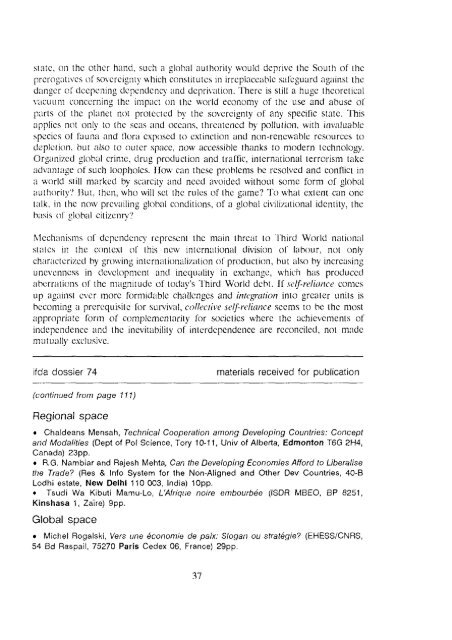ifda dossier 74 - Dag Hammarskjöld Foundation
ifda dossier 74 - Dag Hammarskjöld Foundation
ifda dossier 74 - Dag Hammarskjöld Foundation
You also want an ePaper? Increase the reach of your titles
YUMPU automatically turns print PDFs into web optimized ePapers that Google loves.
state, on the other hand, such a global authority would deprive the South of the<br />
prerogatives of sovereignty which constitutes in irreplaceable safeguard against the<br />
danger of deepening dependency and deprivation. There is still a huge theoretical<br />
vacuum concerning the impact on the world economy of the use and abuse of<br />
parts of the pliinet not protected by the sovereignty of any specific state. This<br />
applies not only to the seas and oceans, threatened by pollution, with invaluable<br />
species of fauna and flora exposed to extinction and non-renewable resources to<br />
depletion, but also io outcr space, now accessible thanks to modern technology.<br />
Organized global crime, drug production and traffic, international terrorism take<br />
tidvaniiige of such loopholes. How can these problems be resolved and conflict in<br />
;l world still marked by scarcity and need avoided without some form of global<br />
authority'! Hut, then, who will set the rules of the game? To what extent can one<br />
talk. in the now prevailing global conditions, of a global civilizalional identity, the<br />
basis of global citizenry?<br />
Mechanisms of dependency represent the main threat to Third World national<br />
states in the context of this new international division of labour, not only<br />
char;icterizecl by growing internationaliziition of production, but also by increasing<br />
unevenness in development and inequality in exchange, which has produced<br />
aberrations ol' the magnitude of today's Third World debt. If scu-relinnce comes<br />
up against ever more formidable challenges and inleginlion into greater units is<br />
becoming a prerequisite for surviv;il, collective self-reliance seems to be the most<br />
appropriate form of complen~entarity for societies where the achievements of<br />
independence and the inevitability of interdependence are reconciled, not made<br />
mutually exclusive.<br />
<strong>ifda</strong> <strong>dossier</strong> <strong>74</strong> materials received for publication<br />
(continued from page 11 1)<br />
Regional space<br />
Chaldeans Mensah, Technical Cooperation among Developing Countries: Concept<br />
and Modalities (Dept of Pol Science, Tory 10-1 1, Univ of Alberta, Edmonton T6G 2H4,<br />
Canada) 23pp.<br />
R.G. Narnbiar and Rajesh Mehta, Can the Developing Economies Afford to Liberalise<br />
the Trade? (Res & Info System for the Non-Aligned and Other Dev Countries, 40-B<br />
Lodhi estate, New Delhi 110 003, India) 10pp.<br />
Tsudi Wa Kibuti Marnu-Lo, L'Afriqiie noire embourbee (ISDR MBEO, BP 8251,<br />
Kinshasa 1, Zaire) 9pp.<br />
Global space<br />
Michel Rogalski, Vers line economic de paix: Slogan ou strategic? (EHESSICNRS,<br />
54 Bd Raspail, 75270 Paris Cedex 06, France) 29pp.
















